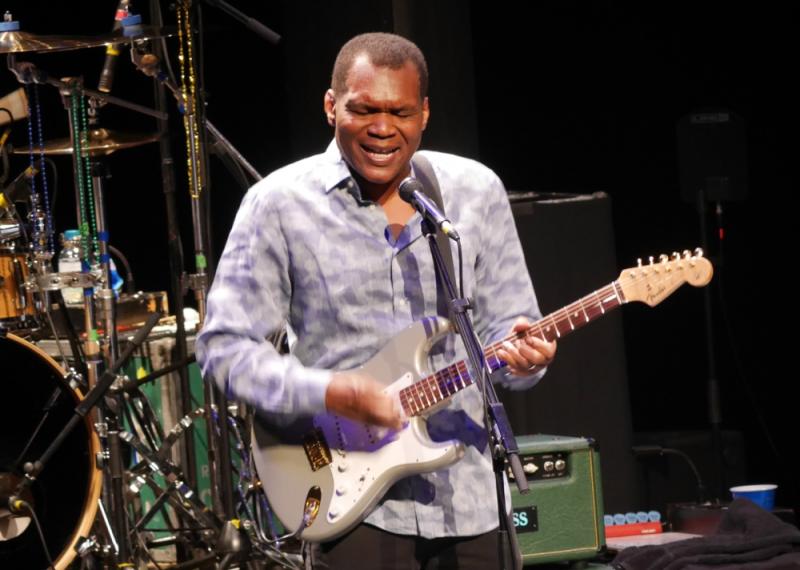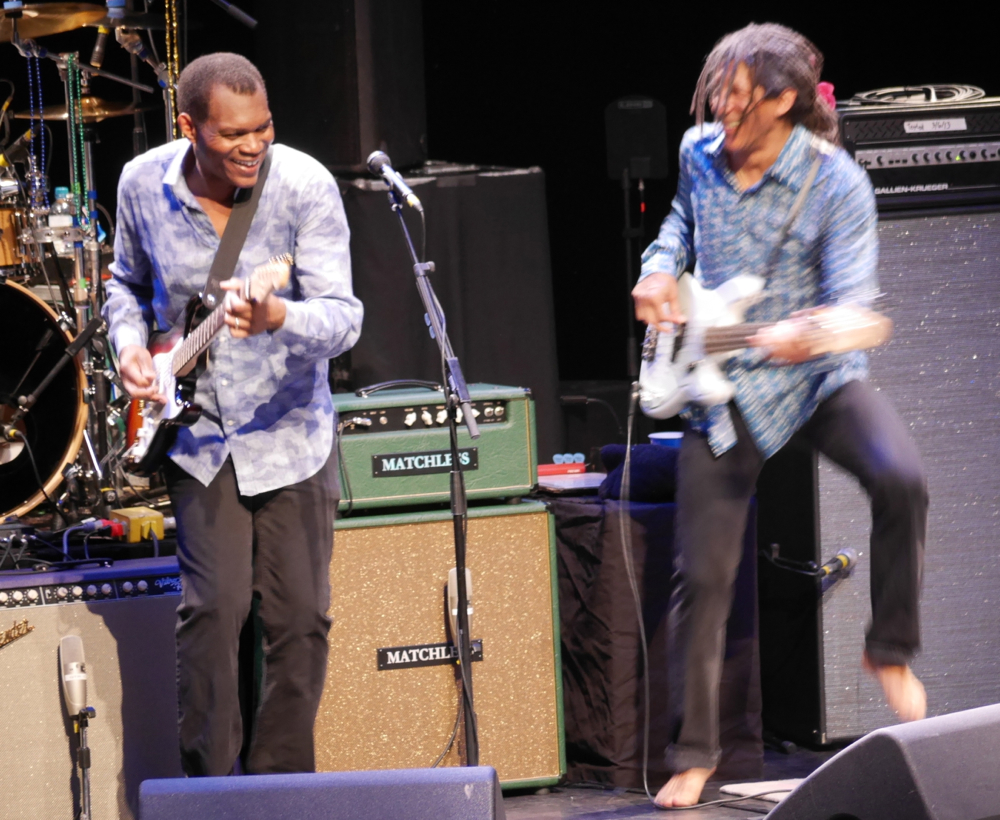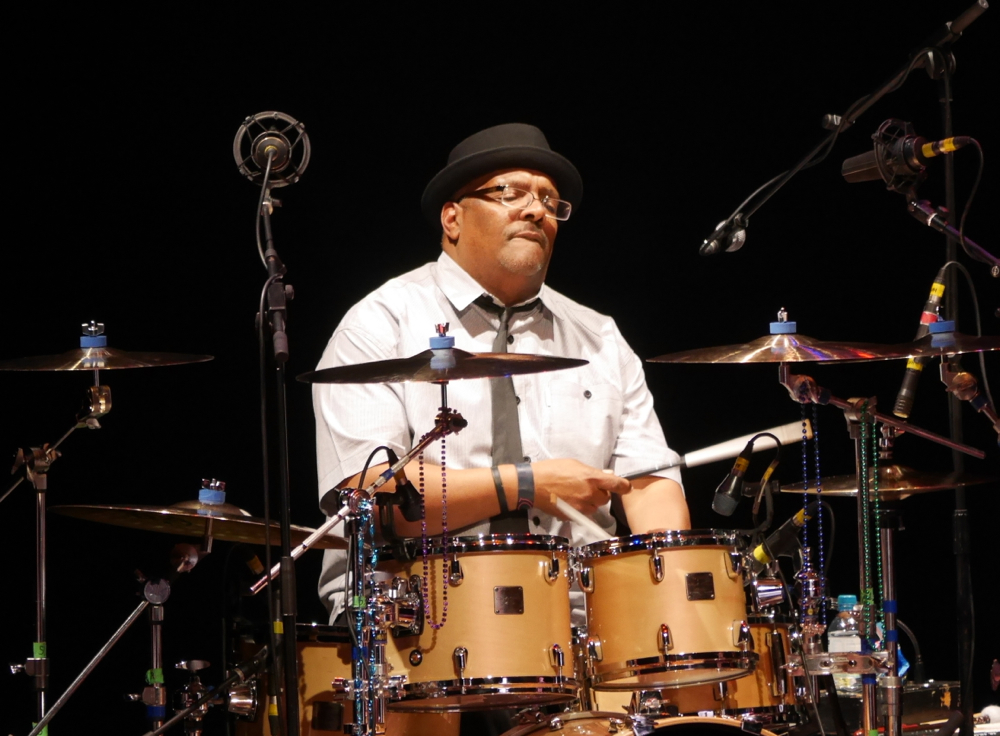Robert Cray Band, Barbican | reviews, news & interviews
Robert Cray Band, Barbican
Robert Cray Band, Barbican
Veteran soul and blues band hits a rich groove of feeling

Robert Cray’s veteran blues band made a compelling case for their unique blend of soul and blues at the Barbican last night. Despite the five Grammys, record sales well into seven figures, and investiture in the Blues Hall of Fame in 2011 at the precocious age of 57, he’s sometimes suspected of watering down the blues tradition.
Off-stage, Cray is considered and soft-spoken. He comes across as a clean-shaven, fresh-scrubbed version of the blues, the sort of musician you could safely introduce to the in-laws. But from the moment the music started last night, there was a scowl in his eye, and an edgy purpose to his manner that showed how well he understood this music’s rebellion and empowerment.
The band has just released a new album, In My Soul, and about half of last night’s programme came from it, though there was a refreshing lack of plugging during the gig. There was a mixture of love songs alongside more domestic themes, in pieces such as Cray's “Poor Johnny”, “Chicken in the Kitchen” and the instrumental piece “Hip Tight Onions”, alluding to Booker T’s “Green Onions”. (Cray positions himself expertly in musical history.)
 Cray the political songwriter (he has played benefit concerts for Barack Obama, and holds moderate, if steadfast, progressive views) came through in “What Would You Say?”, a song about peace. While Cray’s lyrics aren’t, in themselves, especially original, the blizzard of minor chords gives the song serious impact, and the decision to stick with politics is commendable.
Cray the political songwriter (he has played benefit concerts for Barack Obama, and holds moderate, if steadfast, progressive views) came through in “What Would You Say?”, a song about peace. While Cray’s lyrics aren’t, in themselves, especially original, the blizzard of minor chords gives the song serious impact, and the decision to stick with politics is commendable.
There was a familial intimacy about the elastic ensemble of Cray’s band, though this particular formation hasn’t been playing together for long. Bassist Richard Cousins and keys player Dover Weinberg both began playing with Cray in the 1970s, but left after a few years and re-joined much later; drummer Les Falconer joined only last year. Cousins kept largely to the shadows, though Falconer’s nonchalant swagger kept each song on track while Cray’s and Weinberg’s top lines (both on organ and the touches of Waller-esque stride piano, played on the synth) squirmed around one another.
 As the set progressed, the genuine sense of connection with the blues tradition increased. The arrangements provided a delicious range of fat, resonant sounds, from Les Falconer’s bass drum and Dover Weinberg’s swooning, squealing organ, to the slithering ecstasy of Cray’s solo work, and the warm thud of Richard Cousins’ bass. Despite the mournful lyrics, there was an irresistibly defiant spirit to many of these songs. Cray’s guitar solos become increasingly anguished and rebellious, while Weinberg’s organ couldn’t help but hint at the church music that stands in the background of so much of this repertoire.
As the set progressed, the genuine sense of connection with the blues tradition increased. The arrangements provided a delicious range of fat, resonant sounds, from Les Falconer’s bass drum and Dover Weinberg’s swooning, squealing organ, to the slithering ecstasy of Cray’s solo work, and the warm thud of Richard Cousins’ bass. Despite the mournful lyrics, there was an irresistibly defiant spirit to many of these songs. Cray’s guitar solos become increasingly anguished and rebellious, while Weinberg’s organ couldn’t help but hint at the church music that stands in the background of so much of this repertoire.
One of the ever-amusing features of the London music scene is the wounded bemusement of American and Latin American bands looking for a rousing reception, and finding a wall of stony British reserve. Cray’s band received a polite standing ovation at the end of the evening; at least Cray, who has a British wife, must understand. Though their expression was muted, there was no mistaking the audience’s appreciation for these superb musicians, and the raw feeling they so touchingly voiced inside the genteel concrete vaults of EC2.
rating
Buy
Share this article
The future of Arts Journalism
You can stop theartsdesk.com closing!
We urgently need financing to survive. Our fundraising drive has thus far raised £49,000 but we need to reach £100,000 or we will be forced to close. Please contribute here: https://gofund.me/c3f6033d
And if you can forward this information to anyone who might assist, we’d be grateful.

Subscribe to theartsdesk.com
Thank you for continuing to read our work on theartsdesk.com. For unlimited access to every article in its entirety, including our archive of more than 15,000 pieces, we're asking for £5 per month or £40 per year. We feel it's a very good deal, and hope you do too.
To take a subscription now simply click here.
And if you're looking for that extra gift for a friend or family member, why not treat them to a theartsdesk.com gift subscription?
more New music
 'Vicious Delicious' is a tasty, burlesque-rockin' debut from pop hellion Luvcat
Contagious yarns of lust and nightlife adventure from new pop minx
'Vicious Delicious' is a tasty, burlesque-rockin' debut from pop hellion Luvcat
Contagious yarns of lust and nightlife adventure from new pop minx
 Music Reissues Weekly: Hawkwind - Hall of the Mountain Grill
Exhaustive box set dedicated to the album which moved forward from the ‘Space Ritual’ era
Music Reissues Weekly: Hawkwind - Hall of the Mountain Grill
Exhaustive box set dedicated to the album which moved forward from the ‘Space Ritual’ era
 'Everybody Scream': Florence + The Machine's brooding sixth album
Hauntingly beautiful, this is a sombre slow burn, shifting steadily through gradients
'Everybody Scream': Florence + The Machine's brooding sixth album
Hauntingly beautiful, this is a sombre slow burn, shifting steadily through gradients
 Cat Burns finds 'How to Be Human' but maybe not her own sound
A charming and distinctive voice stifled by generic production
Cat Burns finds 'How to Be Human' but maybe not her own sound
A charming and distinctive voice stifled by generic production
 Todd Rundgren, London Palladium review - bold, soul-inclined makeover charms and enthrals
The wizard confirms why he is a true star
Todd Rundgren, London Palladium review - bold, soul-inclined makeover charms and enthrals
The wizard confirms why he is a true star
 It’s back to the beginning for the latest Dylan Bootleg
Eight CDs encompass Dylan’s earliest recordings up to his first major-league concert
It’s back to the beginning for the latest Dylan Bootleg
Eight CDs encompass Dylan’s earliest recordings up to his first major-league concert
 Ireland's Hilary Woods casts a hypnotic spell with 'Night CRIÚ'
The former bassist of the grunge-leaning trio JJ72 embraces the spectral
Ireland's Hilary Woods casts a hypnotic spell with 'Night CRIÚ'
The former bassist of the grunge-leaning trio JJ72 embraces the spectral
 Lily Allen's 'West End Girl' offers a bloody, broken view into the wreckage of her marriage
Singer's return after seven years away from music is autofiction in the brutally raw
Lily Allen's 'West End Girl' offers a bloody, broken view into the wreckage of her marriage
Singer's return after seven years away from music is autofiction in the brutally raw
 Music Reissues Weekly: Joe Meek - A Curious Mind
How the maverick Sixties producer’s preoccupations influenced his creations
Music Reissues Weekly: Joe Meek - A Curious Mind
How the maverick Sixties producer’s preoccupations influenced his creations
 Pop Will Eat Itself, O2 Institute, Birmingham review - Poppies are back on patrol
PWEI hit home turf and blow the place up
Pop Will Eat Itself, O2 Institute, Birmingham review - Poppies are back on patrol
PWEI hit home turf and blow the place up
 'Fevereaten' sees gothic punk-metallers Witch Fever revel in atmospheric paganist raging
Second album from heavy-riffing quartet expands sonically on their debut
'Fevereaten' sees gothic punk-metallers Witch Fever revel in atmospheric paganist raging
Second album from heavy-riffing quartet expands sonically on their debut

Add comment